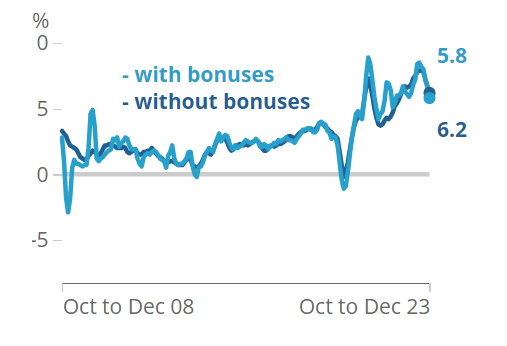Office for National Statistics (ONS) release latest figures; TUC respond
Estimates of employment, unemployment, economic inactivity and other employment-related statistics for the UK (Feb 2024)

The Office for National Statistics (ONS) released their latest labour market figures yesterday, Tuesday 13th February, showing slow pay growth, large scale long-term sickness and that 1.1 million people were on zero hours contracts at the end of 2023.
The ONS summarised their main points thus:
“This release sees the reintroduction of Labour Force Survey data, which now include the latest population information. Over the last year, growth in employment has slowed and over the same period the proportion of people economically inactive has increased, with historically high numbers of people reporting that they are long-term sick.
Payrolled employees in the UK rose by 31,000 (0.1%) between November and December 2023 and rose by 401,000 (1.3%) between December 2022 and December 2023. While the number of payrolled employees continues to increase, the rate of annual growth is decreasing.
The early estimate of payrolled employees for January 2024 increased by 48,000 (0.2%) on the month and increased by 413,000 (1.4%) on the year to 30.4 million. The January 2024 estimate should be treated as a provisional estimate and is likely to be revised when more data are received next month.
Because of increased volatility of Labour Force Survey estimates resulting from smaller achieved sample sizes, estimates of quarterly change should be treated with additional caution and we recommend using them as part of our suite of labour market indicators alongside workforce jobs, claimant count data and Pay As You Earn Real Time Information estimates.
The UK employment level for those aged 16 years and over is up both on the year and on the quarter. The UK employment rate (75.0%) for those aged 16 to 64 years remains below estimates a year ago (October to December 2022), but increased in the latest quarter. The UK unemployment rate (3.8%) for those aged 16 years and over decreased in the latest quarter, returning to the rate a year ago (October to December 2022).
The UK economic inactivity rate (21.9%) for those aged 16 to 64 years was largely unchanged in the latest quarter but is above estimates a year ago (October to December 2022). The annual increase was driven by those inactive because they were long-term sick, which remains at historically high levels.
The UK claimant count for January 2024 increased by 14,100 on the month and by 61,200 on the year to 1.579 million.
In November 2023 to January 2024, the estimated number of vacancies in the UK fell by 26,000 on the quarter to 932,000. Vacancies fell on the quarter for the 19th consecutive period but are still above pre-coronavirus (COVID-19) pandemic levels. The current sequence of quarterly falls in our vacancy estimates is the longest ever recorded, but has slowed in the latest period, with the smallest fall in the number of vacancies since May to July 2022.
Nominal earnings growth remains strong, although it has eased a little in recent periods. Annual growth in total earnings (including bonuses) in Great Britain was 5.8% in October to December 2023, and annual growth in employees’ average regular earnings (excluding bonuses) was 6.2%.
Real pay growth continues as inflation continues to fall. Annual growth in real terms (adjusted for inflation using the Consumer Prices Index including owner occupiers’ housing costs (CPIH)) for total pay rose on the year by 1.4% in October to December 2023, and for regular pay rose on the year by 1.8%.
There were 108,000 working days lost in December 2023 because of labour disputes across the UK. The health and social work industry showed the most working days lost this month.”
You can read the full report here.
Responding, TUC General Secretary Paul Nowak said:
“These figures show how people’s lives are being held back by the government’s failure to invest in our NHS. 2.8 million people are out of work because of long-term sickness and the numbers are still rising.
Average pay is still worth £12 a week less than before the financial crisis 16 years ago and more than a million people are on zero hours contracts. The Conservative legacy is low pay, ill health and more job insecurity.
It’s time for change. We need a proper plan for jobs, growth and public services to get living standards rising sustainably again.”







